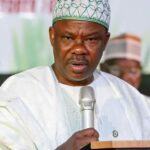Benita Nnenna Nnachortam is a 26-year-old visual artist and storyteller. She was the official photographer for Senator Ibikunle Amosun, when he served as the governor of Ogun State.
A graduate of International Law and Diplomacy, she is also the Team Lead, Ben Teller Media, and Founder/Creative Director of the Kuta Arts Foundation. In this interview, she talks about working for the government, documentary photography and more. Excerpts:
What was it like working as the official photographer for Senator Ibikunle Amosun when he was Ogun State governor?
I worked with him at a very key point in my life when I was moving from being a graduate to a work environment. He took me knowing fully well that I was raw talent. He believed in me because he saw my passion and dedication to the job.
I wasn’t always able to show up when he expected and it was a struggle on so many occasions. But he gave me the chance to grow and learn, to see first-hand what leading is like. It’s a life lesson I can never pay for. It was a once in a lifetime opportunity and I will forever be grateful to him. It was rewarding because he paid me well and it was the most engaging and longest photography job I have ever done.

How did photography begin for you?
I am a visual artist passionate about youth development, culture and art for social change. I have been in this industry for close to eight years now. As far back as 2010 when I was a student at Babcock University, my friends always said I was a good photographer when I was just using my phone to shoot. A number of friends liked to ask me to take photographs for them because they believed it would come out well. So, this propelled me and I decided to learn professionally in 2012.
Who are your mentors in the industry?
In my journey as a photography, I have always had to cross paths with people who have inspired, motivated and coached me. I would start with the most recent one, someone who has had a significant impact in my coming to limelight. It’s Bayo Omoboriowo, the president’s official photographer. He organized a workshop in 2016 where he noticed my work and gave me the opportunity to grow and develop myself.
Which of your work would you consider a favourite and why?
There is this particular picture I shot in 2016. It may not mean a lot to people, but it is a strong part of my story. I took it towards the end of a documentary road trip in 2016. The experience was quite remarkable and the picture itself was strong. It’s that of a girl standing and staring in a marketplace. It drew the attention of mentors like Bayo Omoboriowo, Tom Saater, Yunusa Tanko Abdullahi and other friends in the industry.

What keeps you going in this ‘male dominated’ industry?
I think the idea of photography being a male dominated industry is gradually fading away. This is because a lot of ladies are in key positions as female photographers. The photographer to the wife of the president and vice president are females. It is a big statement. One of the top photographers in Nigeria is TY Bello.
What keeps me going? I hear my mother’s voice in my head telling me “you better do well.” I have that background and upbringing where people expect so much from me.
How did your parents feel when you delved into photography?
They didn’t take it very well. I come from a typical African home. An Igbo home where every penny counts. My parents are relentless traders who worked hard. My dad stopped his education at Primary 6. He struggled all his life to put food on the table and to get us into the best schools. Coming from a university like Babcock where my tuition fee was up to N1million, it was a slap on their faces when I said I wanted to pick up a camera and start chasing people about. That was how they saw it.
So, yes, my parents did not receive it well. They questioned me and I was able to answer them. I later brought results. It’s not to be taken lightly when your child shows up and says the president’s photographer is interested in me because my work. Till today they are not entirely comfortable with it. They don’t want me to just be another photographer because there are many. I think that has helped because till today, I keep doing more.

Would you say photography is a lucrative business?
It is. To a photographer in a remote area in Anambra, photography may not be a lucrative business. But there are clients who would ask a photographer like me to come to Anambra to shoot their wedding or to cover and profile their companies for N1,000,000 or N600,000 or more. They would do that job and that photographer in the village will still be there struggling.
Photography has been very lucrative for me. It puts food on the table and sponsors my passion project, Kuta Arts Foundation, which is giving me access to an amazing network and takes me out of the country.
What are you working on at the moment?
At Kuta Arts Foundation we are working at building an art centre. This would create a space for young creative talents in Ogun State. We have been on it for a while and have been advocating for the importance of art centres and spaces in our community. That’s for Ogun State. I am also working on that at the international scene by forming a network with creative hub leaders towards creating art spaces for young talents. Young people really want to learn and grow but they need spaces that would help them thrive.


